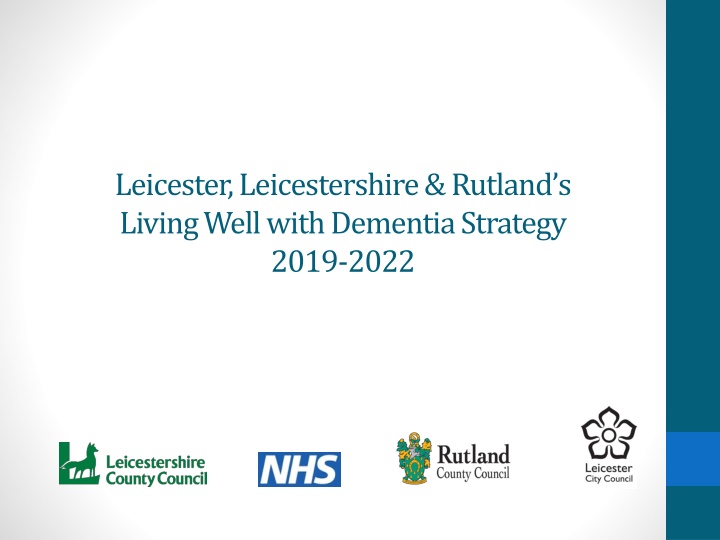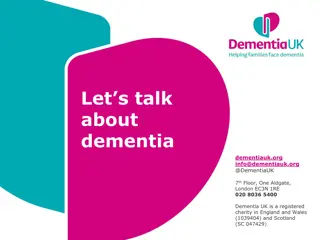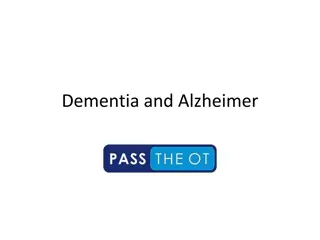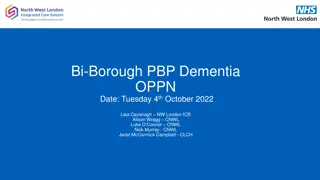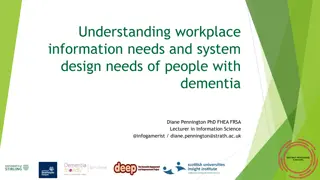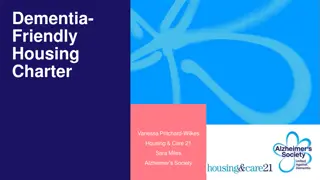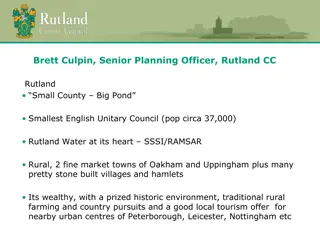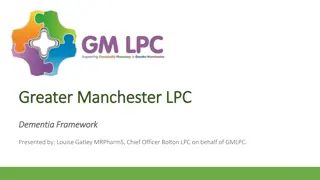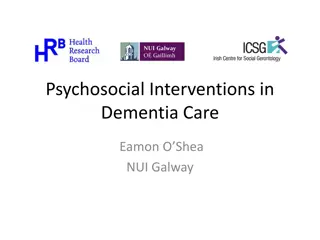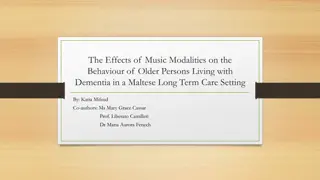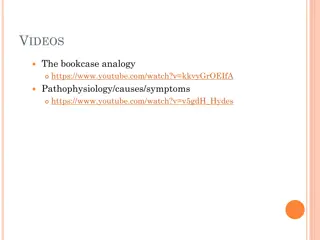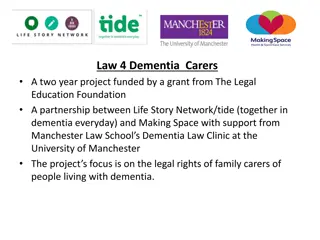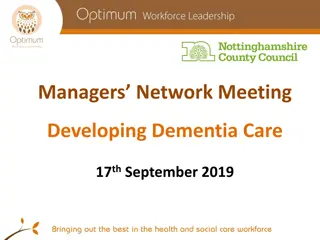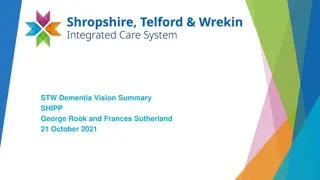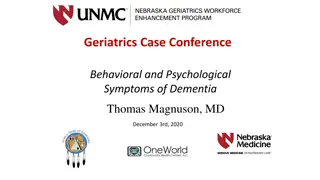Living Well with Dementia Strategy for Leicester, Leicestershire & Rutland
Supporting individuals living with dementia and their carers is a priority for Leicester, Leicestershire, and Rutland (LLR) health and social care organizations. This strategy aims to enhance the well-being and quality of life for those affected by dementia, focusing on personalized and integrated care, access to diagnosis and support services, and transformation of dementia care within the community.
Download Presentation

Please find below an Image/Link to download the presentation.
The content on the website is provided AS IS for your information and personal use only. It may not be sold, licensed, or shared on other websites without obtaining consent from the author.If you encounter any issues during the download, it is possible that the publisher has removed the file from their server.
You are allowed to download the files provided on this website for personal or commercial use, subject to the condition that they are used lawfully. All files are the property of their respective owners.
The content on the website is provided AS IS for your information and personal use only. It may not be sold, licensed, or shared on other websites without obtaining consent from the author.
E N D
Presentation Transcript
Leicester, Leicestershire & Rutlands Living Well with Dementia Strategy 2019-2022
1. Introduction Supporting and helping those living with dementia and their carers remains a priority for Leicester, Leicestershire and Rutland s (LLR) health and social care organisations. Our strategy sets out the Leicester, Leicestershire and Rutland ambition to support people to live well with dementia. It reflects the national strategic direction outlined in The Prime Minister s Challenge on Dementia which details ambitious reforms to be achieved by 2020. The strategy is informed by what people have told us about their experiences either as a person living with dementia or as a carer and is written for those people; specifically those with memory concerns, those with a dementia diagnosis, their families and carers and the organisations supporting them. Leicester, Leicestershire and Rutland s Living Well with Dementia Strategy 2019-2022 has been developed in partnership between local health, social care and voluntary sector organisations. An important focus of our strategy is to move towards delivery of personalised and integrated care. We have used the NHS England Well Pathway for Dementia* to give us a framework that puts the individual and their carer at the centre of service development and implementation across health and social care. We acknowledge that by collaborating in this way, efficiencies across the wider health and social care system will also be realised. As a partnership, we are committed to minimising the impact of dementia whilst transforming dementia care and support within the communities of Leicester, Leicestershire and Rutland, not only for the person with dementia but also for the individuals who care for someone with dementia. We also aim to improve access to diagnosis and support services for all patients and service users, especially those from Black, Asian, minority ethnic and hard to reach groups who currently do not access services. We want the well-being and quality of life for every person with dementia to be uppermost in the minds of our health and social care professionals. *list of reference websites provided at the end
2. What is dementia? Dementia describes a set of symptoms that include loss of concentration and memory problems, mood and behaviour changes and problems with communicating and reasoning. These symptoms occur when the brain is damaged by certain diseases, such as Alzheimer s disease, a series of small strokes or other neurological conditions such as Parkinson s disease. Prime Minister s Challenge on Dementia 2020 All types of dementia are progressive. The way that people experience dementia will depend on a variety of factors therefore the progression of the condition will be different. People of any age can receive a dementia diagnosis but it is more common in those over the age of 65. Early onset dementia refers to younger people with dementia whose symptoms commence before the age of 65. Younger people with dementia often face different issues to those experienced by older people. No two people with dementia are the same and therefore the symptoms each person experiences will also differ. Links to further information about the different types of dementia are provided at the end.
3. Vision, guiding principles and aim This strategy has been guided by principles developed by NHS England in their transformation framework. This Well Pathway for Dementia is based on NICE guidelines, the Organisation for Economic Co-operation and Development framework for Dementia and the Dementia I-statements from The National Dementia Declaration. Our vision is that Leicester, Leicestershire and Rutland are all places where people with dementia can live well through the following guiding principles: Preventing Well Diagnosing Well Supporting Well Living Well Dying Well We aim to create a health and social care system that works together so that every person with dementia, their carers and families have access to and receive compassionate care and support not only prior to diagnosis but post-diagnosis and through to end of life.
4. National context and background Legislation Care Act 2014 There are a number of national drivers that shape and influence the way the UK should tackle dementia as a condition Equality Act 2010 Equality Act 2010 Prime Minister s Challenge on Dementia 2020 In February 2015, the Department of Health published a document detailing why dementia remains a priority and outlined the challenges the UK continues to face in relation to dementia. The priorities identified within this are: To improve health and care To promote awareness and understanding Research Prime Minister s Challenge on Dementia 2020 In February 2015, the Department of Health published a document detailing why dementia remains a priority and outlined the challenges the UK continues to face in relation to dementia. Context Living Well with Dementia 2009 The priorities identified within this are: 1) To improve health and care 2) To promote awareness and understanding 3) Research Dementia 2015 NHS & Adult Social Care Outcomes Frameworks Fix Dementia Care 2016
National picture Gender In the UK 61% of people with dementia are female and 39% are male. There are a higher proportion of women with dementia as women tend to live longer, however, this does reverse when considering the data for people with early-onset dementia. It is estimated that 1 in 3 people in the UK will care for someone with dementia in their lifetime Male There are currently 850,000 people living with dementia in the UK. 42,325 of these have early onset dementia. 39% 61% Female The number of people with dementia is forecast to increase to 1,142,677 by 2025 an increase of 40%. Dementia and Ethnicity It is estimated that there are 11,392 people from black and minority ethnic (BME) communities who have dementia in the UK. 6.1% of all those are early onset, compared with only 2.2% for the UK population as a whole, reflecting the younger age profile of BME communities. 93.9% 1 in 3 people who die over the age of 65 years have dementia. Dementia now accounts for 11.6% of all recorded deaths in the UK. 1 in every 14 of the population over 65 years has dementia 6.1%
5. Local context and background The key local policy documents that influence the delivery of the strategy Better Care Together (BCT) is the programme of work that plans to transform the health and social care system. The Sustainability and Transformation Partnership (STP) in LLR is derived from this programme and is developing proposals across a variety of health and social care areas, to enable us to plan and be responsive to the needs of the whole population. The dementia work stream has established a programme board with membership across partnership organisations and linked to the wider STP programme. Leicestershire County Council Adult Social Care Strategy 2016-2020 The Dementia Programme Board has written this strategy and high-level delivery plan. The multi- agency partnership works to ensure that interdependencies are identified including but not limited to: Home First Urgent and emergency care Integrated locality teams Resilient primary care Planned care Mental health Prevention Medicines Management Learning disabilities End of life Continuing health care and personal budgets Leicester City CCG West De Montfort University Leicestershir e CCG Leicester City Council Adult Social Care: Strategic Commissioning Strategy 2015-2019 East Leicestershir e Police Leicestershir e and Rutland CCG Dementia Programme Board Leicestershir e County Council Leicester City Council Rutland County Council The Future of Adult Social Care in Rutland 2015 2020 Age UK Leicestershir e & Rutland Rutland County Council The Leicestershir e Partnership Trust Alzheimer s Society Clinical Commissioning Group Operational Plans 2018-2019 University Hospitals of Leicester Healthwatch University Hospitals of Leicester NHS Trust Dementia Strategy 2016-2019 Funding in relation to dementia is not directly addressed within this strategy. However the financial position cannot be ignored therefore the available resources for each organisation will be reflected in individual organisational plans that will be developed by partners setting out their role in the delivery of the strategy.
Local picture Gender Male Across LLR 60% of people with dementia are female and 40% are male. This reflects the national trend. 40% There are currently 13,372 people living with dementia across Leicester, Leicestershire & Rutland. This number is set to increase to 16,969 by 2025. 269 of these people have early onset dementia. 60% Female It is estimated that there are 105,000 carers across LLR. For further information relating to carers, see the draft LLR Carers Strategy. 1 in every 14 of the population of LLR over 65 years has dementia, reflective of the national trend
Local picture The dementia diagnosis indicator compares the number of people thought to have dementia with the number of people diagnosed with dementia. The target set by NHS England is for at least two thirds of people with dementia to be diagnosed (67%). The national prevalence of dementia is 1.3% of the entire UK population equating to approximately 850,000 individuals. Local NHS Diagnosis Rates Leicester City 87% West Leicestershire 73% (Percentages represent the proportion of people living with dementia that have a formal diagnosis as of November 2017) East Leicestershire & Rutland 67% 9,642 individuals thought to be living with dementia 9,458 of these are 65 years or over The total population of people aged 65 years or over is 139,400 which equates to 6.78% of this cohort of the population living with dementia Leicestershire 3,026 individuals thought to be living with dementia 2,951 of these are 65 years or over The total population of people aged 65 years or over is 41,700 which equates to 7.07% of this cohort of the population living with dementia Leicester 704 individuals thought to be living with dementia 694 of these are 65 years or over The total population of people aged 65 years or over is 9,500 which equates to 7.3% of this cohort of the population living with dementia Rutland
Local picture - What people told us My husband needs to go somewhere to help him feel like a man again (carer of person with dementia) I was very depressed after diagnosis. I felt suicidal (person living with dementia) We need somewhere for people to go and sit down and get proper advice (person living with dementia) My GP couldn t find anywhere to accept the referral for my husband when seeking a diagnosis because he was too young (carer of younger person with dementia) Once you have a diagnosis of dementia, you are written off as far as any other problem is concerned (person living with dementia)
6. How dementia support currently looks across LLR General medical practice Memory clinics Community dementia support services such as those provided by Admiral Nurses, the Alzheimer s Society and Age UK, including support for carers Social care services including care management and assistive technology services Advocacy services and deprivation of liberty safeguards services Extra care, residential and nursing homes Members of Dementia Action Alliances working towards creating more dementia friendly communities Advice and information services, including welfare benefits
7. Achievements of the previous LLR Strategy 2011 2014 GPs have been supported to understand and promote key preventative messages as well as developing health checks and a dementia friendly GP toolkit Engagement with people living with dementia and their carers has been undertaken across the area to understand their experiences of the health and social care system to inform future work All CCG areas are meeting the 67% national target in relation to diagnosis rates and appropriate referrals are being made to memory assessment clinics, underpinned by a shared care agreement The memory pathway is well embedded across the area with good connections form primary care, memory clinics, post diagnostic support services, social care A new community and hospital based Dementia Support Service has been commissioned across Leicester and Leicestershire, with a single point of access for people with dementia, carers and professionals Rutland commissioned a dementia support service who worked with local partners to support people with dementia and their carers Contract monitoring was undertaken by all commissioners and aimed to ensure that people with dementia were cared for and supported well Carers are supported through specific services, including advice, information, training and respite
7. Achievements of the previous LLR Strategy 2011 2014 Voluntary and community sector organisations offer training programmes for people with dementia and carers. NHS and social care organisations offer staff training programmes Advocacy services and deprivation of liberty safeguards services are in place to give people with dementia a voice Assistive technology solutions are widely offered to people living with dementia and carers Strong links have been made with the local Dementia Action Alliance social movement to recruit dementia friends and work towards creating more dementia friendly communities A variety of social opportunities such as activity groups, memory cafes, befriending is available to support people and carers to live well with dementia Advice and information is available throughout the memory pathway
8. LLR Dementia Strategy Delivery Plan 2019 - 2022 This delivery plan will be refreshed on an annual basis to ensure its relevance. Actions have been agreed as a result of engagement with stakeholders and feedback from public consultation. Each member of the LLR Dementia Programme Board will reflect these delivery actions in their own organisational plans and the needs of under-represented groups will be considered in all of the actions listed below. Action Responsible Guiding Principle Actioned By Pilot the Dementia Friendly general practice template and consider how to rollout more widely CCGs Preventing Well 2019/2020 Promote the inclusion of dementia risk reduction messages within health checks across primary care CCGs Preventing Well 2019/2020 Increase Public Health involvement in the work of the DPB LLR Dementia Programme Board Preventing Well 2019 Promote opportunities to be involved in research to people affected by dementia and their carers throughout the memory pathway LLR Dementia Programme Board Preventing Well 2019/2020 Review memory assessment pathway and referral processes CCGs and LPT Diagnosing Well 2019/20 Promote memory pathway LLR Dementia Programme Board 2019/20 Diagnosing Well To develop a process to increase the number of people receiving a dementia diagnosis within 6 weeks of a GP referral CCGs Diagnosing Well 2020/21
8. LLR Dementia Strategy Delivery Plan Action Responsible Guiding Principle Actioned By Work with care homes to pilot and roll out the dementia diagnosis toolkit CCG and Local Authority Commissioners Diagnosing Well 2020/2021 Monitor the Dementia Support Services contracts and take action as appropriate Local Authority Commissioners Supporting Well Ongoing Raise awareness of dementia with housing providers LLR Dementia Programme Board Supporting Well 2020/2021 Contribute to a review of the workforce development offer to ensure a focus on high levels of expertise when delivering personal care Health and Social Care professionals and workforce development providers Supporting Well 2019/2020 Continue to focus on improving the in-patient experience and hospital discharge pathways LLR Dementia Programme Board Supporting Well 2019/2020 Promote Dementia Support Services across LLR Health and Social Care professionals and providers Living Well 2019/2020
8. LLR Dementia Strategy Delivery Plan Action Responsible Guiding Principle Actioned By Support the work to improve residential provision for people with complex dementia CCG and Local Authority Commissioners Living Well 2019/2020 Support the Dementia Action Alliance to develop more dementia friendly communities LLR Dementia Programme Board Living Well 2019/2020 Develop routine engagement processes with people living with dementia and carers to inform our work LLR Dementia Programme Board Living Well 2019/2020 Review the dementia information offer to ensure it covers a range of topics, including accommodation options LLR Dementia Programme Board Living Well 2020/2021 Review the current care and support standards used across LLR and agree a common set Health and Social Care professionals and providers Living Well 2020/2021 Work with care homes and other providers to develop training and support to manage crises and work with reablement principles Health and Social Care professionals and providers Living Well 2020/2021 Make stronger links with STP End of Life work-stream LLR Dementia Programme Board Dying Well 2019/2021
9. Useful websites Context NHS England Well Pathway for Dementia: england.nhs.uk/mentalhealth/wp-content/uploads/sites/29/2016/03/dementia-well-pathway.pdf Further information about the different types of dementia: nhs.uk/conditions/dementia-guide/Pages/dementia-choices.aspx and alzheimers.org.uk/info/20007/types_of_dementia Prime Ministers Challenge on Dementia: gov.uk/government/publications/prime-ministers-challenge-on-dementia-2020 Living Well with Dementia: gov.uk/government/uploads/system/uploads/attachment_data/file/168221/dh_094052.pdf Dementia 2015 Aiming Higher to Transform Lives (report by the Alzheimer s Society): alzheimers.org.uk/info/20093/reports/253/dementia_2015 NHS Outcomes Framework & Adult Social Care Outcomes Framework 2016-17: gov.uk/government/uploads/system/uploads/attachment_data/file/513157/NHSOF_at_a_glance.pdf gov.uk/government/uploads/system/uploads/attachment_data/file/629812/ASCOF_handbook_definitions.pdf Fix Dementia Care 2016: alzheimers.org.uk/info/20175/fix_dementia_care Legislation Care Act 2014: legislation.gov.uk/ukpga/2014/23/contents/enacted Equality Act 2010: gov.uk/guidance/equality-act-2010-guidance Local Policy Leicestershire County Council Adult Social Care Strategy 2016 2020: leicestershire.gov.uk/sites/default/files/field/pdf/2016/3/23/ASC_Strategy_2016_2020_0.pdf Leicester City Council Adult Social Care: Strategic Commissioning Strategy 2015-2019: leicester.gov.uk/media/179825/strategic-commissioning-strategy-2015-2019.pdf Draft Leicester, Leicestershire and Rutland Carers Strategy: leicestershire.gov.uk/carers-strategy Rutland County Council The Future of Adult Social Care in Rutland: rutland.gov.uk/my-services/health-and-family/adult-social-care/adult-social-care-strategy East Leicestershire and Rutland Operational Plan 2016-2017 West Leicestershire Operational Plan 2016-2017 Leicester City Operational Plan 2016-2017 University Hospitals of Leicester NHS Trust Dementia Strategy April 2016 March 2019: leicestershospitals.nhs.uk/EasysiteWeb/getresource.axd?AssetID=41809&type=full&servicetype=Attachment
